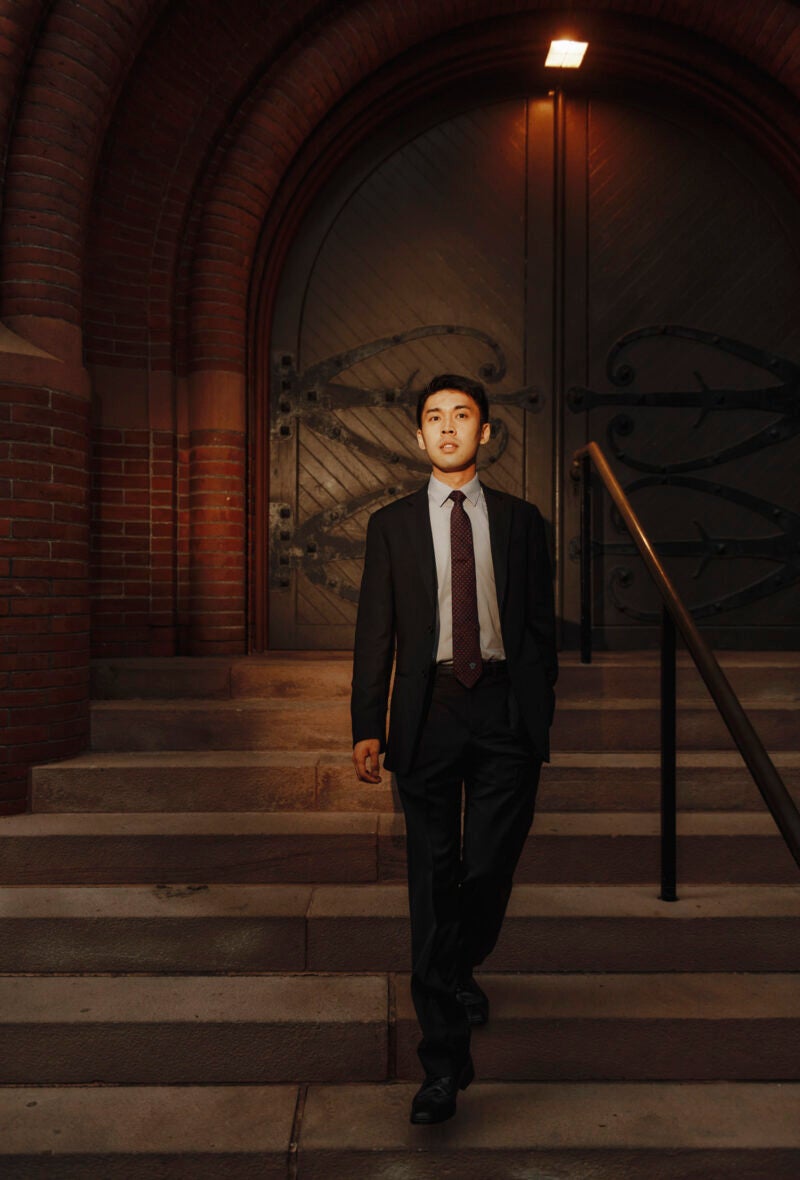Chung Hon Michael Cheng ’24 sat down for his first piano lesson on March 19, 2002, when he was 4 years old. It was his mother’s idea: “Everyone at my school played an instrument, so we never thought twice about it,” says Cheng, who lived in Hong Kong until age 9. His mother also wanted to ensure he had a trade to fall back on when he was older: “She thought that, even if everything completely fell apart, I could still make a living teaching piano.”
So far, that hasn’t been necessary. This past year, Cheng worked as a summer associate at three different law firms in New York, Washington, D.C., and Houston, experiencing the different offerings of each — “big law” and boutique, litigation and transactional. After he graduates, he will be joining Cravath, Swaine & Moore in New York before clerking on the United States Court of Appeals for the 3rd Circuit in 2026.
Cheng graduated from Harvard in 2019 with an A.B. in physics and an S.M. in engineering sciences; he also earned an S.M. from MIT’s Technology and Policy Program in 2021. All the while, he has continued to play piano and compose music, winning top honors at international and national competitions for both, including two first-place finishes at the Music Teachers National Association’s composition competition. Cheng began writing music around age 5 or 6: “I started off just copying and tweaking existing scores I could get my hands on, but then, at some point, the ideas became original,” he says. “I played a lot with Legos as a kid, but rather than following the instructions, I would just mix my sets together and build my own designs. So maybe I’ve always had this innate impetus to create new things.”
“Law and music are both crafts; you lay on brick after brick to build your wall. They are both lifelong endeavors.”
Cheng submitted an original choral piece based on “Fair Harvard” as part of his undergraduate application to the college, and not long after he arrived, he connected with Andrew Clark, Harvard’s director of choral activities. Upon Clark’s invitation, Cheng joined the Harvard Choruses New Music Initiative, a program launched in 2016 for Harvard undergraduate composers to write choral music. As his senior year approached, Cheng began planning a musical tribute to his time at Harvard. “I decided that the concept would be to use one excerpt of text from each of Harvard’s five centuries of history,” he says. Beginning with the single word “Veritas,” the piece then draws from Psalm 78, the writings of Ralph Waldo Emerson, the autobiography of Helen Keller, and the spoken-word poetry of Donovan Livingston, an alumnus of the Harvard Graduate School of Education. “Veritas: A Celebration of the Centuries” was performed at Harvard College’s Baccalaureate ceremony in May 2019 and again at both university-wide Commencement ceremonies in 2022.
For Cheng, fitting music into his life had always been a balancing act, but as a law student, finding time to devote to music has been even more challenging: “The time constraints force me to be surgical and targeted in the way I practice, and sometimes I’d get up early to practice before going to class,” says Cheng, who as a 1L was a top finalist of the 2022 International J.S. Bach Piano Competition in Saarbrücken, Germany. “A lot of my musical development has been happening in the interstices of my life as a law student — for example, listening to music while working and then reflecting on the music while I’m on my way to class.”
Still, he has found time to create. As a 2L, he composed (and performed) “Machine Dreams,” a five-movement piano quintet inspired by the evolution of the human relationship with technology and created at the behest of Sheila Jasanoff ’76, a professor at the Harvard Kennedy School, as part of the 20th anniversary celebration for the Harvard Program on Science, Technology & Society in November 2022. After that came a similar request from Ruth L. Okediji LL.M. ’91 S.J.D. ’96, HLS’s Jeremiah Smith, Jr. Professor of Law, to which Cheng responded with the choral anthem “Come, Let Us Rebuild,” inspired by a verse from the Old Testament book of Nehemiah. He conducted the anthem’s premiere at “Faith & Veritas,” the inaugural Harvard-wide gathering of Christian alumni in April 2023.
There’s a long list of composers who have studied law, observes Cheng, citing Handel, Schumann, Tchaikovsky, and Sibelius, among others. He notes the parallels between the two disciplines: “Law and music are both crafts; that is, you lay on brick after brick to build your wall. They’re both lifelong endeavors of continual improvement, and that appeals to me.” He cites J.S. Bach as his favorite composer and describes his own style as “informed by tradition at a high level, yet unmistakably modern.”
As to the connections between STEM and music, Cheng says: “I mean, at a fundamental level, music is physics. But sometimes, I also let myself get inspired by the engineering and the tech, kind of like how other composers would, you know, get inspired by poetry or something.” He adds: “I try to write music that is internally rigorous and generally logical and methodical in design — I focus on structure and the internal coherence of musical ideas. That, I think, very much comes from my training in science and is reinforced by my legal education.”
Cheng professes surprise and gratitude that he has been able to continue pursuing music this far beyond his undergraduate years. And he feels invigorated by the need to strike an ever-evolving balance between law and music, pursuits he views as mutually reinforcing. But all this balancing does involve tradeoffs: “Sometimes, I discover that the readings don’t do themselves after all,” he says.
“That’s when I’d usually get cold-called.”
